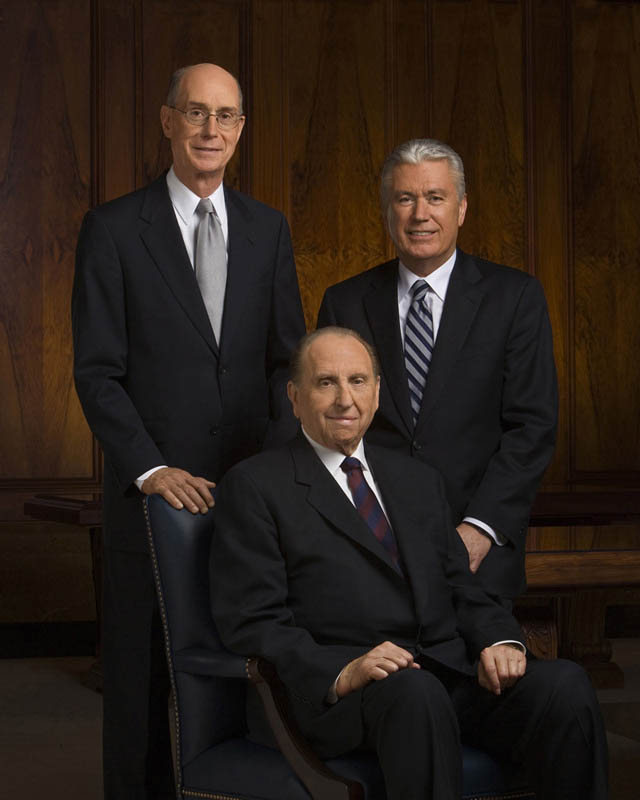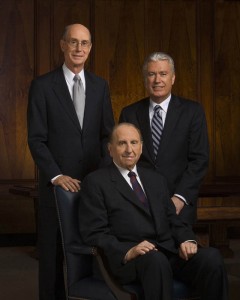I love reading the diaries and journals of Joseph Smith, the first prophet of The Church of Jesus Christ of Latter-day Saints, known as the Mormons. I especially love the early ones which are written in Joseph Smith’s own hand. You get exposed to Joseph Smith’s mind, unfiltered. There are no scribes, no copyists, no amanuenses—just Joseph Smith and his quill.
28 November 1832 • Wednesday
This day I have spent in reading and writing. This evening my mind is calm and serene, for which I thank the Lord.
4 December 1832 • Tuesday
This day I been unwell; done but little. Been at home all day. Regulated some things. This evening feel better in my mind then I have for a few days back. Oh Lord, deliver thy servant out of temptations and fill his heart with wisdom and understanding.
13 October 1833 • Sunday
Held a meeting at Freeman Nickerson’s. Had a large congregation. Brother Sidney preached and I bore record to the people. The Lord gave His Spirit in a marvelous manner, for which I am thankful to the God of Abraham. Lord, bless my family and preserve them.
(Source: Personal Writings of Joseph Smith, 21-24. Standardized)
I also love reading the journal entries from people who heard Joseph Smith speak. Of course the best source on what Joseph Smith said is Wilford Woodruff’s journal. As an early member and later apostle, he was close to Joseph Smith. Whenever he attended a meeting where Joseph Smith spoke, he paid close attention, kept notes, and then recorded the sermon into his own private journal.
He explained that this journaling was more than a compulsion:
“I have been inspired and moved upon to keep a journal and write the affairs of this Church as far as I can. I did not understand why my feelings were exercised so much in the early age of this Church, but I understand it now. I seldom ever heard Brother Joseph or the Twelve preach or teach any principle but what I felt as uneasy as a fish out of water until I had written it. Then I felt right. I could write a sermon of Joseph’s a week after it was delivered almost word for word, and after it was written, it was taken from me or from my mind. This was a gift from God unto me.” (Chapter 13: Journals: “Of Far More Worth than Gold”, Teachings of Presidents of the Church: Wilford Woodruff, 125.)
B. H. Roberts, a church leader and scholar, made this observation:
“As historian President Woodruff rendered a most important service to the church. His Journals regularly and methodically and neatly kept and strongly bound, extending as they do from 1834 to April 18th, 1897, (with some scattering notes through the remainder of 1897, and the year 1898 when he was in his ninety-second year)—a period of sixty-three years—constitute an original documentary historical treasure which is priceless. The church is indebted to these Journals for a reliable record of discourses and sayings of the Prophet of the New Dispensation—Joseph Smith—which but for him would have been lost forever. …”
“Other men may found hospitals or temples or schools for the Church, or endow special divisions or chairs of learning in them; or they may make consecrations of lands and other property to the Church but in point of important service, and in placing the Church under permanent obligations, no one will surpass in excellence in permanence or largeness the service Wilford Woodruff has given to the Church of Jesus Christ in the new dispensation, by writing and preserving the beautiful and splendid journals he kept through sixty-three years—so far do the things of mind surpass material things” (Comprehensive History of the Church 7:354-355).
You sense the early saints’ love for Joseph Smith. They took the time to record the words of the man whom they believed to be a prophet. It was not only love for the words, but also a desire to have correct information. Joseph Smith noted, “In these infant days of the Church, there was a great anxiety to obtain the word of the Lord upon every subject that in any way concerned our salvation.” (History of the Church 1:207)
This was a crucial problem for a church with so many new members. They had to weed out old ideas, and plant new seeds of correct doctrine. On August 6, 1838, Joseph Smith suggested that the members of the Church in Far West, MO have a weekly newspaper “to unite the people” (History of the Church 3:56). These early newspapers also had reports on Joseph Smith’s sermons and revelations.
Nowadays we have The Ensign, a monthly magazine, and the Church has a web page, www.lds.org. But the point is the same: we have access to the words of the living prophet.
Saturday, April 5th, 2008, Thomas S. Monson was installed as president of The Church of Jesus Christ of Latter-day Saints. Like the people in Joseph Smith’s day, I have a desire to hear, obey, and to have the words of the prophet. And not only to have them, but to have them in a form that allows for easy access.
A few years ago I was in a regional training meeting with Presiding Bishop H. David Burton. In the course of his training, he held up a white three-ring binder. He said—and I am working from memory; the meeting happened about seven years ago—that this was his Hinckley Bible.
(Gordon B. Hinckley was the president of the Church at the time.)
He then apologized to anyone if they found the expression offensive. He explained that this three-ring binder contained copies of all of President Hinckley’s public addresses he had given since being called as prophet. He used it as reference and resource whenever he had to give talks or train people.
I laughed. I did the same thing with President Howard W. Hunter, who was the prophet before President Hinckley. I got copies of some of his general conference talks (using the Teachings of the Living Prophets packet from BYU), then I kept Xeroxing talks as he gave them, and copied his home teaching articles as they were published. I also had some information from his biography, and occasionally had to call his office to get some addresses that I could not track down.
At this time I was serving as stake Sunday School president (and yes, there were a lot of “the other President Hunter” jokes), and used this homemade collection for teaching and training ward Sunday School teachers and presidents. When President Hunter’s book That We Might Have Joy was published, I carried both my collection and the book as I did my rounds as a stake officer.
Yesterday, I got a large three-ring binder and began my collection for President Thomas S. Monson. So far it has his funeral address for President Hinckley, his statement to the press (I had to transcribe this from the internet video), his world-wide leadership sermon, and the April 2008 home teaching message. I will add his General Conference addresses when they become available.
This collection is not only an expression of my love for the man and his office, but also my desire to really follow the living prophet. I will have all of his talks at my fingertips, ready for any assignment or teaching moment. There is both security and power in having the living prophet’s words so accessible.
About kendalbhunter
Twitter •



